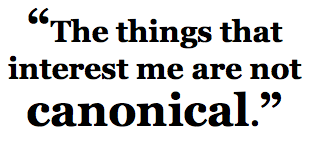
RD: The same way that it was hard for your 22-year-old self to project where you would be now, it can be hard to make an unqualified declaration like, “I’m going to be the person who cares about this in 10 years,” because you don’t know.
PF: You don’t, right? You could die. Things like that happen.
RD: You could have been so sure that you would be the one to take care of it, that you wouldn’t have made any kind of plan for what would happen if you did die.
PF: Or your kid is sick, or something fundamental happens… That’s the reality of life. So, do you create an institution for that? I think we’re very lucky to have Archive.org. It is as good as it gets, right now, and no one has done better. It’s done really well at blustering through, instead of librarian infighting.
RD: It’s sort of the anti-Facebook, right? And maybe by way of that, the anti-TNR, where it’s also someone’s project. They’ve got means, and they’ve decided that rather than focus on the moment, rather than use this to be sort of day-to-day relevant, I’m going to train these resources on the very opposite, which is things that have reached their end. Things that are not being updated anymore.
PF: I could actually define — this will be very pretentious, but — if I could define an aesthetic for myself, it is ephemeralism. The things that interest me are not canonical. I find book stores really boring, which is sad, because I’m writing a book. But constructed environments around getting you to buy things or do things — which include newspapers, book stores, late-night television —